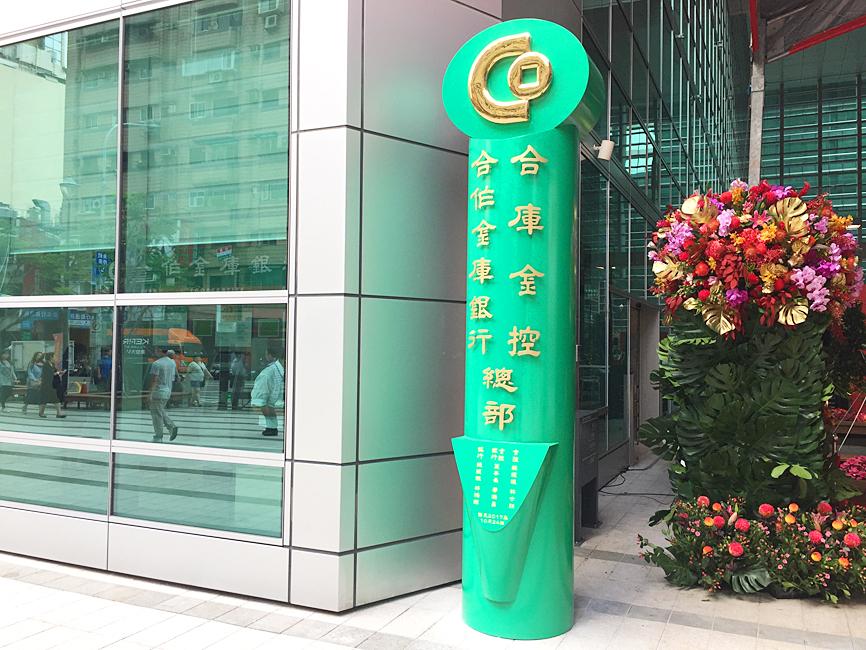Taiwan Cooperative Financial Holding Co (TCFH, 合庫金控) aims to improve its business next year in line with the nation’s economic growth, but uncertainty related to the COVID-19 pandemic lingers, top executives told an investors’ conference yesterday.
The guardedly positive view was shared after the state-run conglomerate reported NT$12.39 billion (US$429.75 million) in net income for the first three quarters — a 6.29 percent decline from the same period last year, as the low interest rate environment restricted its earnings ability, TCFH president Chen Mei-tsu (陳美足) said.
That translated into earnings per share of NT$0.9, down from NT$0.97 for the same period last year, company data showed.

Photo: Lu Kuan-cheng, Taipei Times
“We will take cues from the nation’s GDP growth next year in setting profitability goals,” Chen told an online conference call, adding that the Directorate-General of Budget, Accounting and Statistics in August forecast that Taiwan’s economy would grow 3.92 percent next year.
The company’s main subsidiary, Taiwan Cooperative Bank (合庫銀行), saw its net income shrink 10.09 percent year-on-year to NT$10.7 billion due to a drop in interest and fee incomes, as well as an increase in bad loans and provision costs, Chen said.
The interest spread for local and foreign currency loans narrowed to 1.282 percent at the end of September from 1.316 percent in June, TCFH’s report showed.
Net interest margin, a critical gauge for the banking industry, stood at 0.966 percent in September, compared with 0.993 percent three months earlier.
The lender attributed the retreat to interest rate cuts at home and abroad, as well as competition among its peers to woo customers.
Chen said net interest margin showed signs of stabilization last quarter, but added that it is too early to talk about a recovery.
TCFH said fee income dropped 1.44 percent from a year earlier, after its wealth management business tumbled 9.48 percent and credit card operations plunged 49.61 percent.
Sales of insurance policies took a hard hit from drastic interest cuts, while international travel restrictions significantly dampened interest in card spending abroad, it said.
The situation is unlikely to improve until the world returns to normal, TCFH said.
It said that it has room to grow its real-estate lending, which stands at 28.25 percent, lower than its peers, adding that it has leeway of NT$56 billion before it hits the 30 percent cap of total deposits and debts.
TCFH said it would seek to raise land and construction financing to NT$140 billion next year, from NT$125.6 billion as of September this year.
The current volume is 20 percent more than it was a year earlier, it said, adding that real-estate loans could increase 24 percent year-on-year if operations reach NT$130 billion at the end of this year as hoped for.

TECH BOOST: New TSMC wafer fabs in Arizona are to dramatically improve US advanced chip production, a report by market research firm TrendForce said With Taiwan Semiconductor Manufacturing Co (TSMC, 台積電) pouring large funds into Arizona, the US is expected to see an improvement in its status to become the second-largest maker of advanced semiconductors in 2027, Taipei-based market researcher TrendForce Corp (集邦科技) said in a report last week. TrendForce estimates the US would account for a 21 percent share in the global advanced integrated circuit (IC) production market by 2027, sharply up from the current 9 percent, as TSMC is investing US$65 billion to build three wafer fabs in Arizona, the report said. TrendForce defined the advanced chipmaking processes as the 7-nanometer process or more

China’s Huawei Technologies Co (華為) plans to start mass-producing its most advanced artificial intelligence (AI) chip in the first quarter of next year, even as it struggles to make enough chips due to US restrictions, two people familiar with the matter said. The telecoms conglomerate has sent samples of the Ascend 910C — its newest chip, meant to rival those made by US chipmaker Nvidia Corp — to some technology firms and started taking orders, the sources told Reuters. The 910C is being made by top Chinese contract chipmaker Semiconductor Manufacturing International Corp (SMIC, 中芯) on its N+2 process, but a lack

NVIDIA PLATFORM: Hon Hai’s Mexican facility is to begin production early next year and a Taiwan site is to enter production next month, Nvidia wrote on its blog Hon Hai Precision Industry Co (鴻海精密), the world’s biggest electronics manufacturer, yesterday said it is expanding production capacity of artificial intelligence (AI) servers based on Nvidia Corp’s Blackwell chips in Taiwan, the US and Mexico to cope with rising demand. Hon Hai’s new AI-enabled factories are to use Nvidia’s Omnivores platform to create 3D digital twins to plan and simulate automated production lines at a factory in Hsinchu, the company said in a statement. Nvidia’s Omnivores platform is for developing industrial AI simulation applications and helps bring facilities online faster. Hon Hai’s Mexican facility is to begin production early next year and the

Who would not want a social media audience that grows without new content? During the three years she paused production of her short do-it-yourself (DIY) farmer’s lifestyle videos, Chinese vlogger Li Ziqi (李子柒), 34, has seen her YouTube subscribers increase to 20.2 million from about 14 million. While YouTube is banned in China, her fan base there — although not the size of YouTube’s MrBeast, who has 330 million subscribers — is close to 100 million across the country’s social media platforms Douyin (抖音), Sina Weibo (新浪微博) and Xiaohongshu (小紅書). When Li finally released new videos last week — ending what has